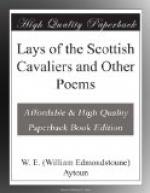As to the motives and intended policy of this remarkable and unfortunate young man, it may be interesting to quote the terms of the proclamation which he issued on the 10th October, 1745, before commencing his march into England. Let his history be impartially read, his character, as spoken to by those who knew him best, fairly noted, and I think there cannot be a doubt that, had he succeeded in his daring attempt, he would have been true to the letter of his word, and fulfilled a pledge which Britain never more required than at the period when that document was penned:—
“Do not the pulpits and congregations of the clergy, as well as your weekly papers, ring with the dreadful threats of popery, slavery, tyranny, and arbitrary power, which are now ready to be imposed upon you by the formidable powers of France and Spain? Is not my royal father represented as a bloodthirsty tyrant, breathing out nothing but destruction to all who will not immediately embrace an odious religion? Or have I myself been better used? But listen only to the naked truth.
“I, with my own money, hired a small vessel. Ill-supplied with money, arms, or friends, I arrived in Scotland, attended by seven persons. I publish the King my father’s declaration, and proclaim his title, with pardon in one hand, and in the other liberty of conscience, and the most solemn promises to grant whatever a free Parliament shall propose for the happiness of a people. I have, I confess, the greatest reason to adore the goodness of Almighty God, who has in so remarkable a manner protected me and my small army through the many dangers to which we were at first exposed, and who has led me in the way to victory, and to the capital of this ancient kingdom, amidst the acclamations of the King my father’s subjects. Why, then, is so much pains taken to spirit up the minds of the people against this my undertaking?
“The reason is obvious; it is, lest the real sense of the nation’s present sufferings should blot out the remembrance of past misfortunes, and of the outcries formerly raised against the royal family. Whatever miscarriages might have given occasion to them, they have been more than atoned for since; and the nation has now an opportunity of being secured against the like in future.




